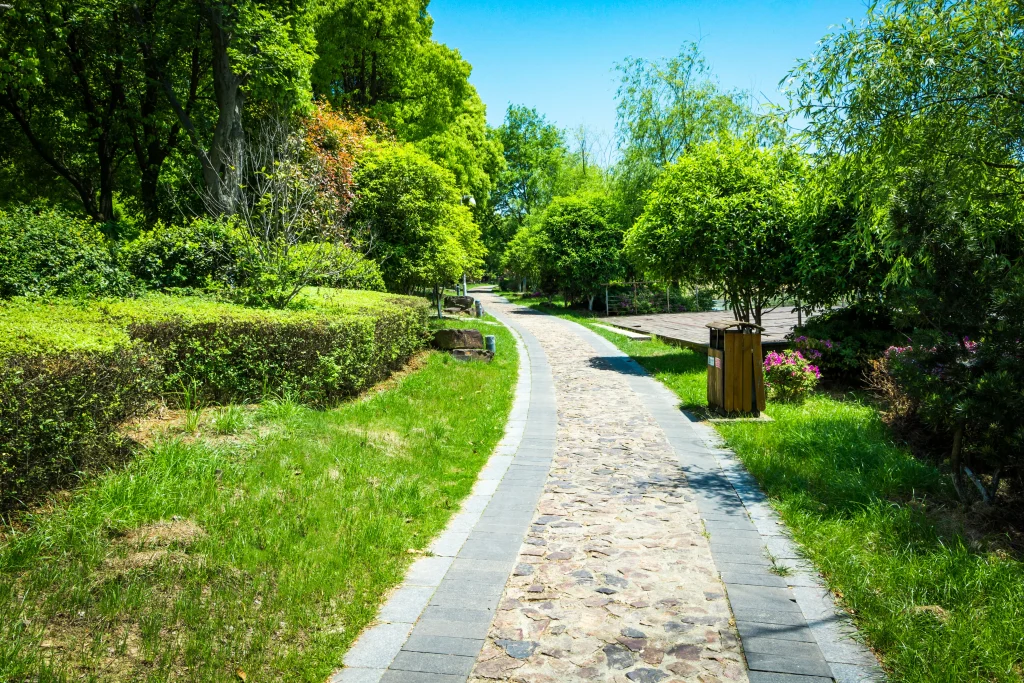If you’re a homeowner battling stubborn patches of clover in your lawn, you’re far from alone. White Dutch clover (Trifolium repens) and its cousins thrive across the Front Range, often popping up even in well-maintained yards.
But what makes Denver lawns so susceptible to clover?
The answer lies in our region’s unique combination of alkaline, low-nitrogen soils and drought-prone summers. Unlike many broadleaf weeds, clover is both drought-tolerant and able to make its own nitrogen, helping it outcompete struggling turfgrass in stressful Colorado conditions.
In this comprehensive guide, we’ll show you how to get rid of clover in lawn (without harming your grass), why it invades Denver yards, and proven strategies for long-term prevention that suit Colorado’s climate and soil.
What Is Clover and What Causes It to Grow in Your Lawn?
Clover is a common perennial broadleaf weed, with white Dutch clover being the most widespread in Denver landscapes. Recognizable by its small, round trifoliate leaves and white or pinkish flower heads, clover spreads quickly by creeping stems and seeds.
While some homeowners value micro clover or mixed grass-clover lawns for eco-friendly reasons, most want a seamless, traditional grass lawn.
Several factors make Denver lawns highly susceptible to clover invasion:
- Low nitrogen levels: Clover fixes its own nitrogen, giving it an edge in poor soils common throughout Colorado.
- Poor or compacted soil: Denver’s heavy, alkaline clay soils restrict turfgrass health but don’t bother clover.
- Underwatering or inconsistent watering: Drought-tolerant clover takes advantage of stressed, dry grass – especially during Colorado’s hot summers.
- Mowing too short: Cutting grass under 2.5 inches exposes soil to sunlight, encouraging clover seeds to germinate and grow.
- Bare or thin patches: Any area where grass doesn’t grow densely provides open space for clover to establish.
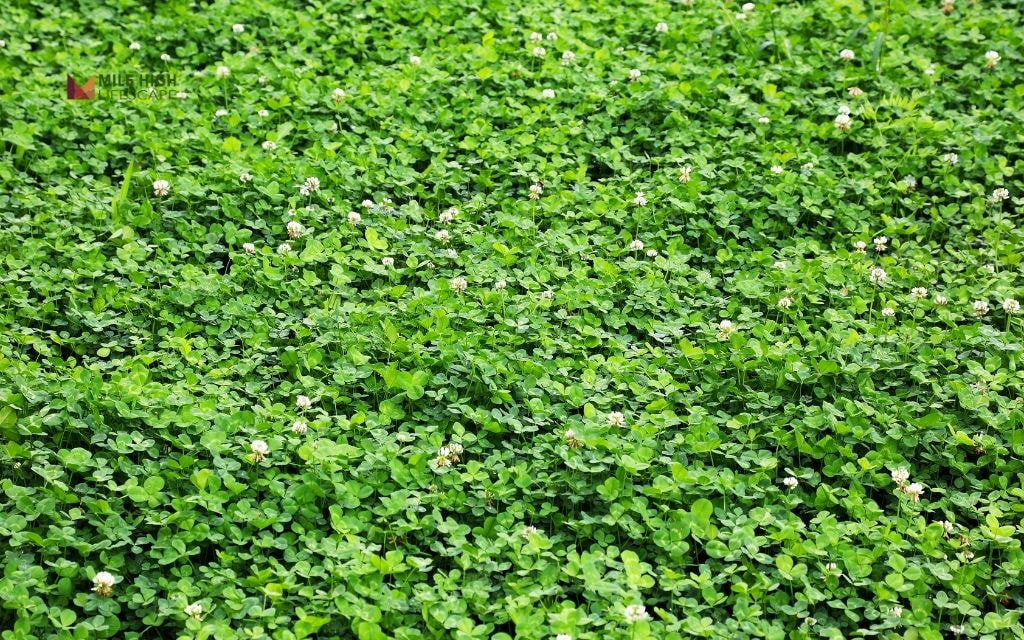
How to Get Rid of Clover in Lawn (Without Killing Grass)
Removing clover without damaging your lawn requires a strategic approach. Here are proven methods tailored to Denver’s growing conditions:
#1: Proper Mowing Practices
Set your mower height to 2.5-3 inches for cool-season grasses common in Denver. This height strengthens grass while shading clover, preventing its spread.
Avoid cutting more than one-third of the grass blade during any single mowing session.
Keep your mower blades sharp for clean cuts that heal quickly. Dull blades tear grass, creating entry points for disease and weakening the lawn’s ability to compete with clover.
During spring’s rapid growth period, you might need to mow weekly, while summer may require less frequent mowing to reduce stress on grass during Denver’s hottest months.
#2: Manual Removal
For small clover patches, hand-pulling remains effective when done correctly.
Wait until after rain or irrigation when Denver’s often-dry soil softens. Grasp clover at its base and pull gently to extract the entire root system. Fill the resulting bare spots with grass seed suited to Colorado’s climate to prevent new weeds from establishing.
When hand-pulling, focus on removing the entire plant, including all stems and roots.
The white clover’s creeping stems (stolons) spread along the soil surface and can regenerate if left behind. Work in sections of your lawn to ensure thorough removal, and dispose of pulled clover in yard waste bags rather than composting to prevent reseeding.
#3: Lawn Aeration
Denver’s clay soils compact easily, creating perfect conditions for clover. Core aeration breaks up compaction, allowing grass roots to access oxygen, water, and nutrients.
Schedule aeration for early fall or spring when grass actively grows in Colorado’s climate. This improves soil structure and helps grass outcompete clover naturally.
For best results, aerate when soil is moist but not saturated. The hollow tines should remove soil cores 2-3 inches deep. Leave these cores on the lawn where they’ll break down naturally, returning valuable organic matter to the soil.
Annual aeration makes a significant difference in reducing conditions favorable to clover.
#4: Strategic Fertilization
Apply a high-nitrogen fertilizer to promote thick grass growth while discouraging clover. Choose a formulation with slow-release nitrogen specifically designed for Colorado’s alkaline soils.
Apply in spring and fall when cool-season grasses in Denver establish and strengthen their root systems. The nitrogen boost eliminates clover’s primary competitive advantage.
For Denver lawns, select fertilizers with an NPK ratio featuring higher nitrogen (first number). A product with 24-4-8 or similar ratio works well for most Colorado lawns.
#5: Overseeding Bare Areas
Clover quickly colonizes thin spots in Denver lawns. Overseed these areas with grass varieties adapted to Colorado’s climate, such as turf-type tall fescue or Kentucky bluegrass blends.
The best time for overseeding in Denver is late summer to early fall (August through September), giving seed time to establish before winter.
Before overseeding, rake the area gently to expose soil and remove dead vegetation. Apply seed at the rate recommended on the package for your specific grass type.
Cover seeds with a thin layer of topsoil or compost (¼ inch) to improve seed-to-soil contact. Water newly seeded areas lightly twice daily for the first two weeks to maintain consistent moisture without washing away seeds.
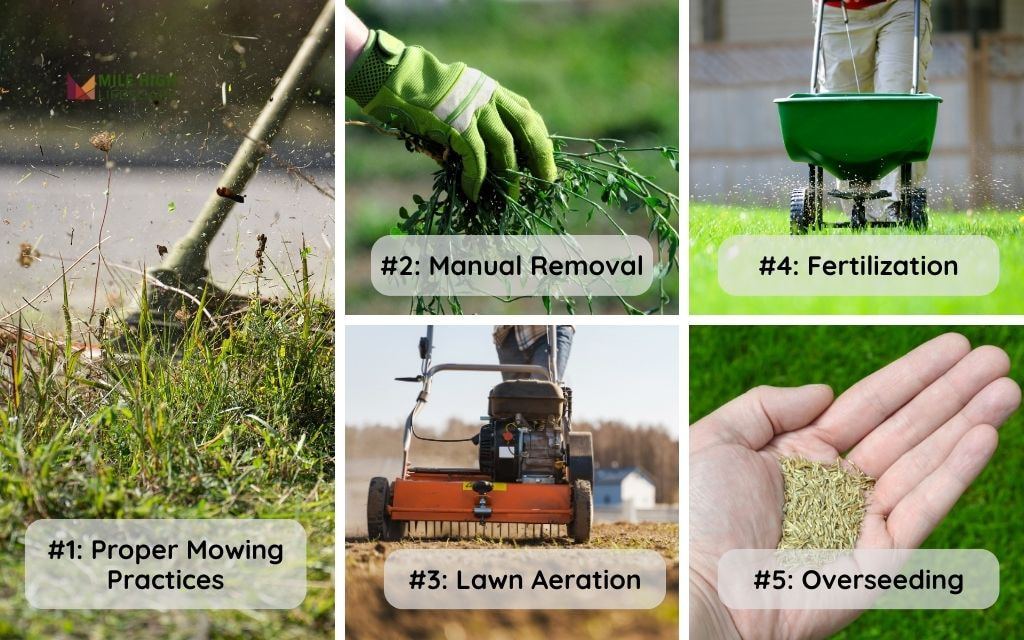
#6: Selective Herbicide Application
To kill clover without harming grass, select broadleaf herbicides containing triclopyr, 2,4-D, or dicamba. Apply when temperatures range between 65-85°F – avoid application during Denver’s hot summer days or when rain threatens within 24 hours.
Follow label directions precisely regarding application rates for your lawn size. For environmentally conscious homeowners, look for organic broadleaf weed control products containing iron HEDTA.
For best absorption, apply when clover actively grows and avoid mowing for at least 48 hours before and after application. Most herbicides require dry conditions for 24 hours following application to maximize effectiveness.
#7: Water Management
Denver’s semi-arid climate requires strategic watering. Deep, infrequent irrigation (about 1 inch once or twice weekly depending on season) promotes deep grass roots while discouraging shallow-rooted clover.
Water in the early morning to minimize evaporation and disease potential. Consider installing a smart irrigation controller programmed for Colorado’s specific water needs.
#8: Soil pH Adjustment
Test your soil pH, as Denver soils typically range from 7.5-8.0 (slightly alkaline), which clover tolerates well. While drastically altering soil pH proves challenging, small adjustments help grass compete.
Apply sulfur amendments according to soil test recommendations to gradually lower pH toward 6.5-7.0, creating conditions where grass thrives and clover struggles.
#9: Corn Gluten Application
Apply corn gluten meal as a natural pre-emergent herbicide in early spring before clover seeds germinate. This organic option prevents clover seeds from sprouting while providing nitrogen to existing grass.
For Denver lawns, apply at a rate of 20 pounds per 1,000 square feet when forsythia begins blooming, typically in March or early April.
Corn gluten works best when applied to dry lawns, followed by light watering. The effectiveness increases with repeated annual applications.
Note that corn gluten prevents all seeds from germinating for 5-6 weeks, so don’t apply it if you plan to seed your lawn during this period. As a bonus, corn gluten contains about 10% nitrogen, providing a natural fertilizer benefit while suppressing clover.
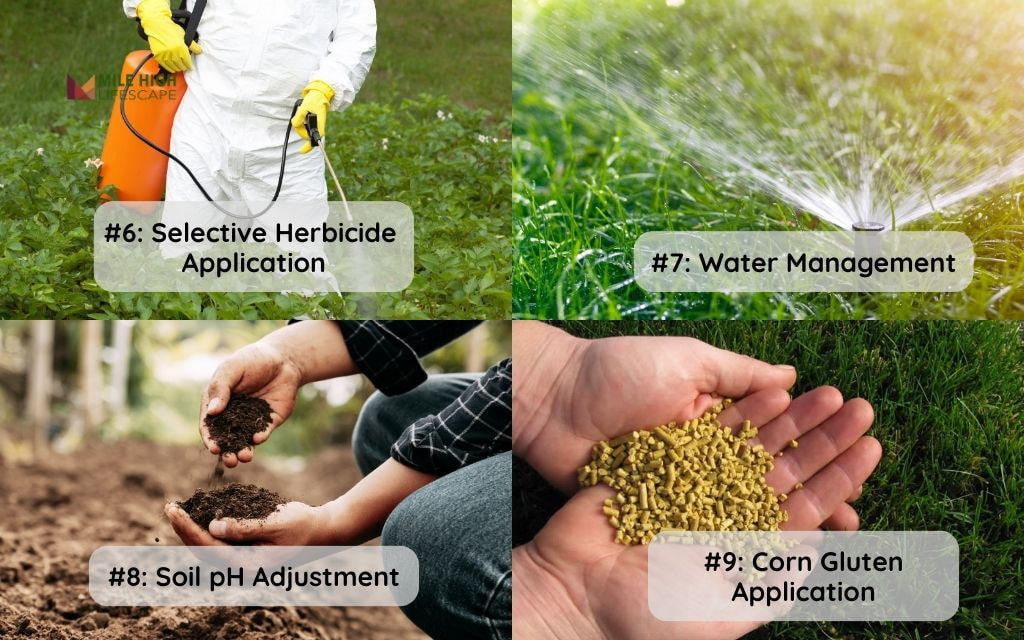
How to Prevent Clover from Coming Back in Denver
Prevention requires consistent lawn maintenance practices tailored to Colorado’s unique growing environment. Implement these strategies to maintain a clover-resistant lawn:
- Apply pre-emergent herbicides in early spring, typically mid-March to early April in Denver, before clover seeds germinate. These products create a chemical barrier in the soil that stops seeds from developing into plants. For a natural alternative, corn gluten meal works similarly while adding nitrogen to the soil.
- Improve drainage across your lawn to eliminate the damp conditions where clover thrives. Denver’s clay-heavy soils often retain moisture unevenly, creating perfect clover habitats. Address drainage issues by core aerating annually, adding organic matter to heavy soils, and correcting low spots where water collects after irrigation or rainfall.
- Apply mulch in landscape beds surrounding your lawn to prevent clover from establishing and spreading into grassy areas. Use 2-3 inches of quality mulch in beds to block sunlight from reaching clover seeds, preventing germination. Cedar, pine straw, or hardwood mulches work well in Denver’s climate and help maintain consistent soil moisture.
- Choose grass varieties specifically adapted to Denver’s climate conditions. Consider drought-resistant varieties of Kentucky bluegrass, turf-type tall fescue, or fine fescue blends that withstand Colorado’s temperature extremes while creating dense turf that naturally suppresses clover.
With over 20 years of landscaping experience in Denver, Mile High Lifescape offers mulch installation services tailored to Colorado’s distinct environmental needs. Although DIY mulching may appear easy, having it done by professionals guarantees you enjoy all the advantages that proper mulching can bring to your Colorado landscape.
Should You Remove Clover?
While many Denver homeowners prefer a pristine grass lawn, it’s important to weigh the pros and cons of clover:
- Benefits: Clover naturally fixes nitrogen in the soil (reducing fertilizer needs), can improve soil health, withstand drought, and attract pollinators like bees and butterflies.
- Drawbacks: Clover disrupts the uniform look of a traditional lawn, competes with desired grasses for space, and can spread quickly if unchecked.
Ultimately, the decision depends on your lawn goals: If appearance and grass density are your top priorities, removing clover makes sense.
If you value organic and sustainable practices, a mixed clover-grass lawn could be a plus.
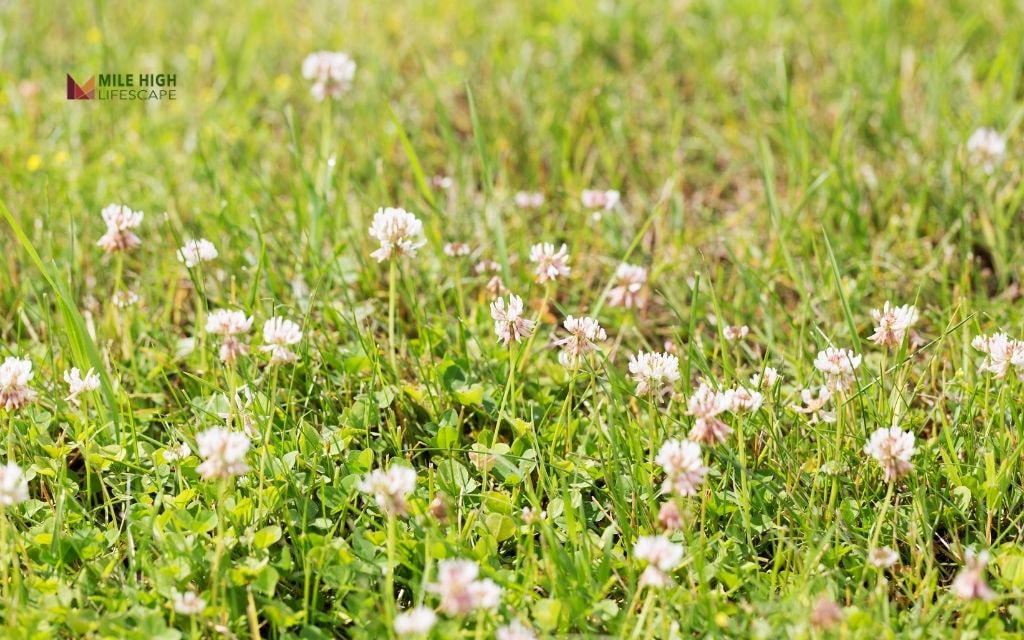
When to Call a Professional Lawn Care Service
Some clover problems just won’t quit. Here’s when reaching out to Mile High Lifescape makes all the difference:
- Clover constantly reappears despite multiple DIY treatments.
- You’re unsure about safe or effective herbicide use on your Denver lawn type.
- Your clover patches are wide, spreading, or mixed with other tough weeds.
- You want a complete lawn renovation (aeration, overseeding, weed control) for a healthy, lasting recovery.
With Mile High Lifescape, you get:
- Expert diagnosis using soil testing and on-site evaluation.
- Custom plans – choose eco-friendly, organic, or chemical solutions based on your preferences.
- Full-service lawn restoration: fertilization, seeding, core aeration, ongoing weed prevention.
- Seasonal care to keep clover and weeds from coming back, year after year.
Contact us today!
Conclusion
Clover invasion in Denver lawns signals specific soil and maintenance issues that, once addressed, can lead to a healthier overall lawn. By understanding why clover appears, you can implement targeted solutions that not only eliminate existing clover but prevent its return.
Success requires consistency in maintaining proper mowing height, fertilization schedules appropriate for Colorado’s growing seasons, and watering practices adjusted for Denver’s semi-arid climate. Remember that building a clover-resistant lawn happens gradually as you improve soil health and grass density.
For persistent problems or when you need expert guidance, Mile High Lifescape provides professional lawn care services specifically designed for Denver’s unique growing conditions.
Contact us for a free lawn assessment to develop a customized clover control strategy that restores your lawn to its full potential.
Frequently Asked Questions (FAQs)
What kills clover but doesn’t kill grass?
To kill clover without harming grass, you can use selective broadleaf herbicides such as those containing triclopyr, 2,4-D, MCPP, or dicamba (like SpeedZone or Trimec). For a natural approach, apply corn gluten meal in early spring as a pre-emergent, and keep your lawn well-fertilized so healthy turf can crowd out clover.
Why am I getting so much clover in my lawn?
Your lawn is getting so much clover because Denver’s soils are often low in nitrogen, compacted, and slightly alkaline – all of which give clover a competitive edge. Inconsistent watering and mowing too short can also encourage clover to establish and spread.
What is the best way to remove clover from a lawn?
The best way to remove clover from a lawn is a combination of pulling by hand, mowing high, aerating, applying nitrogen-rich fertilizer, and overseeding bare spots. For stubborn or spreading clover, use a selective herbicide that won’t damage grass. Follow up with proper lawn care to prevent it from returning.
When should I kill a clover in my yard?
The best time to kill a clover in your yard is in early fall or spring when the clover is actively growing but not drought-stressed. Avoid applying herbicides in extreme heat; for organic options like corn gluten meal, early spring is best to stop new clover from sprouting.
What does clover in the lawn indicate?
Clover in the lawn indicates that your soil likely has low nitrogen levels and may be compacted or slightly alkaline. This signals a need for improved soil fertility, overseeding, and adjusting maintenance practices for healthier, denser grass.
